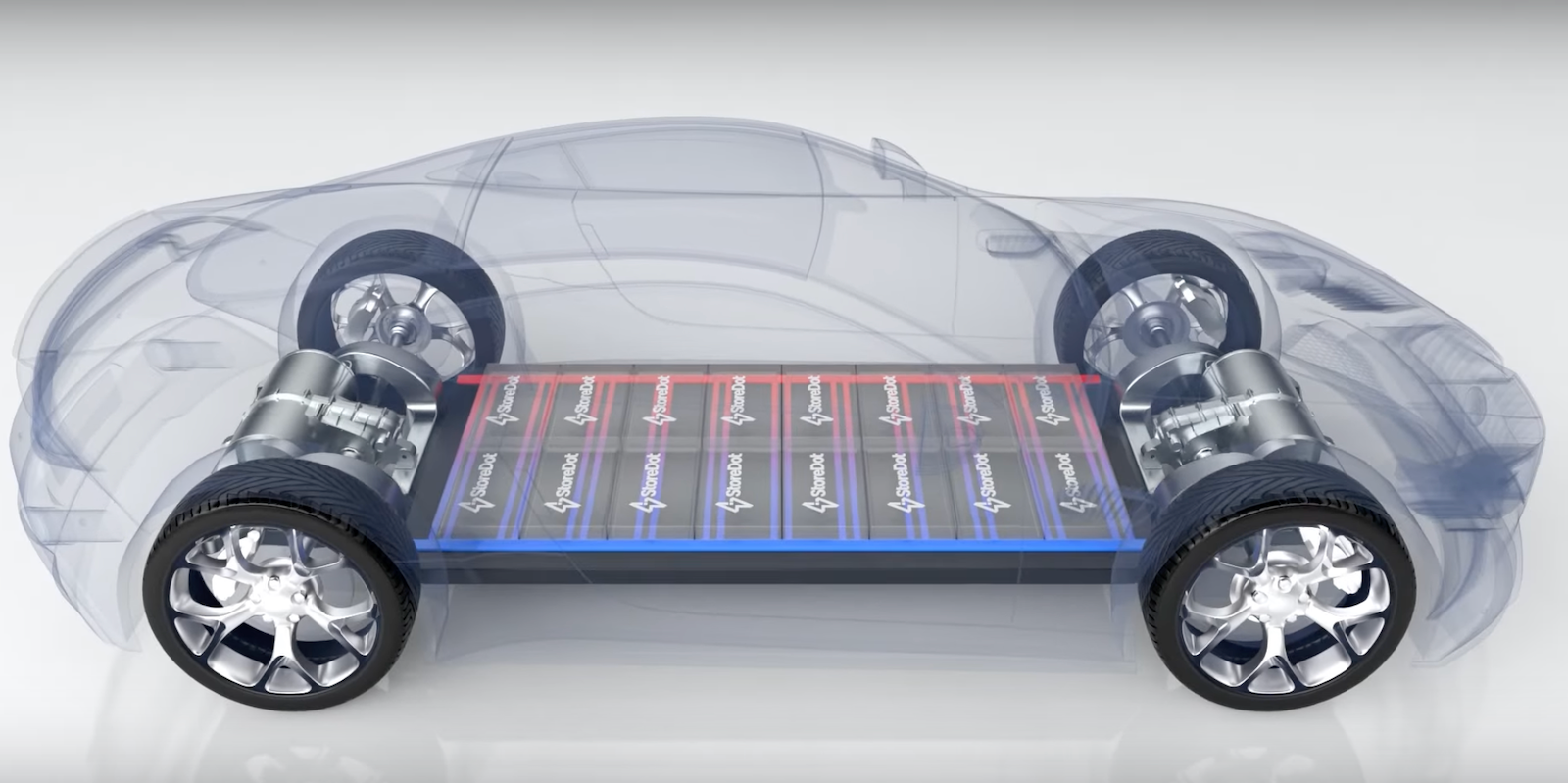Sign up for daily news updates from CleanTechnica on email. Or follow us on Google News!
A blizzard of bad electric vehicle news has been falling thick and fast, but industry watchers are already looking ahead to sunnier days, and technology improvements should also help stir the pot. Among the latest news is a new extreme fast-charging battery from the Israeli startup StoreDot, which promises 100 miles of range in just four minutes.
The Extreme Fast Charging Secret Weapon
The typical rap on electric vehicles is that it takes too long to recharge the battery, compared to firing up an internal combustion engine. That’s going to be a moot point if catastrophic global warming occurs because everyone keeps driving around in carbon-centric cars. Nevertheless, in a busy culture such as ours every minute counts. Recharging an EV battery in the time it takes to fill a gas tank eliminates one strike against electric vehicles.
The availability of public charging stations is another typical critique. Faster-charging batteries would enable one charging station to service more cars in a day, helping to alleviate that issue.
That still leaves the question of EV charging station reliability, which is an important point. Unlike gas stations, many public EV charging stations are located at sites where a human service-person is not around to help with the equipment when trouble arises.
Over the long run, the reliability issue is not a deal breaker. Improvements in remote sensing technology, for example, would enable electric vehicle drivers to plan their trips around functioning stations in real time.
Extreme fast charging is helpful there, too, as it would help make up some of the time lost when a driver needs to make a detour to charge up.
5 Minutes Good, 4 Minutes Better
CleanTechnica has been following StoreDot for several years now. The last time we caught up with them, just four months ago, the company was zeroing in on a 100-mile EV charge in just 5 minutes, putting it into the extreme fast charging category.
For a quick comparison, check out Edmunds’s EV charging review. According to their test results, the chart-topping speed for adding 100 miles of range to an EV battery was 7 minutes and 48 seconds. The test results were published on November 15.
As if to clap back, StoreDot has just reminded everyone that its ultimate goal is a 100-mile, 3-minute charge by 2028, with an intermediate goal of 4 minutes already heaving into view.
“StoreDot has reached its ‘100in4’ milestone ahead of schedule in early prototype tests by implementing a suite of cell enhancements that enable extreme fast charging (XFC) with available infrastructure capabilities,” the company announced earlier this morning.
The Electric Vehicle Of The Future: Three Minutes Even Better
If “early prototype testing” sounds like the real deal is far off in the future, it is not. StoreDot anticipates that the new battery will be ready for mass production in 2026. The company notes that its “100in4” testing sequence has already hit a milestone earlier than planned, that being 1100 extreme fast charging cycles in a small form.
Translated to a large electric vehicle format, that would come out to an energy density of 340 Watt-hours per kilogram.
StoreDot attributes its progress on extreme fast charging to its holistic battery design, which treats charging speed and energy density together rather than focusing narrowly on speed. The goal for the 100in4 battery cells is to increase energy density by at least 10%.
“By taking a balanced, system-level approach, we are unlocking the full potential of our XFC battery technology to maximize real-world performance,” explained StoreDot CEO Dr. Doron Myersdorf in a press statement.
“Rather than prioritizing charging speed, our plan focuses on technological enhancements across the board – energy density, cell and pack design, chemistry, and cooling optimization,” he added.
“The result is an extremely fast charging experience that can be easily deployed on today’s infrastructure,” he emphasized.
To Solid-State Or Not To Solid-State?
To the extent that some potential EV buyers have adopted a wait-and-see attitude, extreme fast charging and longer range could be among the things they are waiting for, as promised by the up-and-coming generation of solid-state EV batteries.
StoreDot is taking an alternative route. Its electric vehicle battery replaces the conventional lithium-ion graphite anode with a patented formula, which the company describes as “bio-inspired active-material nanoparticles that accelerate ion diffusion, for proven quick, safe, and stable charging.”
If that sounds like a silicon battery, it is. CleanTechnica has been tracking the development of next-generation silicon EV battery technology, and StoreDot offers this handy explainer as to why they prefer silicon over solid-state lithium-metal technology:
“…where it takes six carbon (graphite) atoms to bind to a single Li-ion, a single Si atom can bind to four Li ions. This means that the Si anode could theoretically store over 10 times the energy of graphite. What is more, Si is an environmentally friendly and low-cost material.”
“Our silicon is synthesized together with proprietary small-molecule organic compounds, resulting in a highly potent active material that withstands silicon changes, such as the volume expansion during battery charging, issues of energy fade, preeminent rate capability limitations, and enhanced safety,” StoreDot adds.
You could try DIY-ing this at home, but it will take a while. StoreDot’s silicon battery formula is the result of more than 10 years of R&D and a lot of fancy equipment, including machine learning and AI data science.
A New Hope For The Electric Vehicle Revolution Of The Future
As for the mixed picture in electric vehicle sales, there’s more to that than meets the eye. As indicated by CleanTechnica’s Juan Diego Celemín Mojica in a recent report on the South American market, EV sales are impacted by different factors including overall trends in the auto industry, sales of mass transit vehicles, and government incentive policies. Here in the US, one big factor to consider is the recent fall in gasoline prices, which can take the economic bloom off the electric vehicle rose.
Something as offbeat as a stinkbug infestation can also throw a monkey wrench into EV sales in a particular market, as David Waterworth reported earlier this week.
Mixed signals from US policy makers aren’t helping much. Ford, for example, encountered political blowback last summer when news surfaced that battery technology from the leading Chinese firm CATL would be featured in Ford’s plans for a new EV battery manufacturing plant in Michigan.
Ford hit the pause button on the project last September. Though it hit the start button again in November, the company scaled back its planned production by 43%, citing increased labor costs along with a slower-than-expected rate of EV adoption.
They may have to scale back up again. In January, the firm Cox Automotive declared that 2024 will be the “Year of More” for electric vehicles.
“The expectations for EV growth in the U.S. market have shifted from ‘rosy to reality’ as sales increase, but customer acceptance of EVs isn’t keeping pace,” they cautioned, perhaps referring to a recent Consumer Reports review of battery and charging station issues.
“The Cox Automotive team expects that the automobile industry will fully acknowledge the need to convince average consumers of the benefits of electric vehicles,” Cox emphasized.
“However, with more electric vehicle models available, more incentives, more discounts, more advertising, and greater sales efforts, Cox Automotive still expects that electric vehicle sales in the U.S. will exceed the 1-million-unit record set in 2023,” they conclude.
Throwing plug-in EVs and hybrids into the mix, Cox anticipates that EVs could account for almost 24% of the market this year. That doesn’t sound too shabby after all.
Follow me @tinamcasey on Bluesky, Threads, Post, and LinkedIn.
Image (cropped): New silicon extreme fast charging electric vehicle battery (courtesy of StoreDot).
Have a tip for CleanTechnica? Want to advertise? Want to suggest a guest for our CleanTech Talk podcast? Contact us here.
Latest CleanTechnica TV Video
I don’t like paywalls. You don’t like paywalls. Who likes paywalls? Here at CleanTechnica, we implemented a limited paywall for a while, but it always felt wrong — and it was always tough to decide what we should put behind there. In theory, your most exclusive and best content goes behind a paywall. But then fewer people read it!! So, we’ve decided to completely nix paywalls here at CleanTechnica. But…
Thank you!
CleanTechnica uses affiliate links. See our policy here.
[ad_2]
Source link




